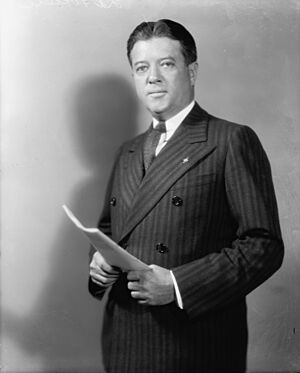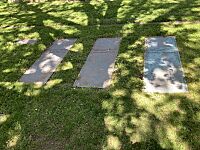Robert M. La Follette Jr. facts for kids
Quick facts for kids
Robert M. La Follette Jr.
|
|
|---|---|
 |
|
| United States Senator from Wisconsin |
|
| In office September 30, 1925 – January 3, 1947 |
|
| Preceded by | Robert M. La Follette |
| Succeeded by | Joseph McCarthy |
| Personal details | |
| Born | February 6, 1895 Madison, Wisconsin, U.S. |
| Died | February 24, 1953 (aged 58) Washington, D.C., U.S. |
| Resting place | Forest Hill Cemetery |
| Political party | Republican (before 1934 & after 1946) Progressive (1934–1946) |
| Spouse |
Rachel Wilson Young
(m. 1930) |
| Children | 2 (including Bronson La Follette) |
| Parents |
|
| Relatives |
|
Robert Marion La Follette Jr. (born February 6, 1895 – died February 24, 1953) was an American politician. He served as a United States senator for Wisconsin from 1925 to 1947.
He was part of the important La Follette family. People often called him "Young Bob" to tell him apart from his famous father, Robert M. "Fighting Bob" La Follette. His father was also a U.S. senator and governor of Wisconsin. Robert Jr. and his brother Philip La Follette continued their father's ideas about progressive politics. They even started the Wisconsin Progressive Party. Robert Jr. was the last big politician from the Progressive Party in the U.S. Senate. This ended in 1946 when the party broke up. He lost his Senate seat in 1946 to Joseph McCarthy.
His son, Bronson La Follette, also became a well-known politician in Wisconsin. He served as the state's attorney general of Wisconsin multiple times.
Contents
Who Was Robert M. La Follette Jr.?
Robert La Follette Jr. was born in Madison, Wisconsin. His parents were Robert M. "Fighting Bob" La Follette and Belle Case La Follette. He had three brothers and sisters, including Philip La Follette and Fola La Follette.
He went to the University of Wisconsin–Madison from 1913 to 1917. However, he did not finish his degree because he got a serious infection. He later received an honorary law degree from the university in 1938. The same illness also kept him from joining the military during World War I.
His Early Career
Before becoming a senator, La Follette Jr. worked for his father. He was his father's private secretary from 1919 to 1925.
Becoming a Senator
On September 29, 1925, Robert La Follette Jr. was elected to the United States Senate. He took over the seat after his father passed away. He was elected as a Republican.
"Young Bob" was known for supporting organized labor, which means he stood up for workers' rights. He became very well known between 1936 and 1940. He led a special Senate committee called the La Follette Civil Liberties Committee. This committee showed how big companies watched, scared, and stopped workers from forming unions.
He also led the Committee on Manufactures in the 71st and 72nd Congresses. He supported President Franklin D. Roosevelt and many of his New Deal laws. However, he disagreed with Roosevelt when a bill to expand the navy passed in 1938.
He was re-elected as a Republican in 1928. Then, he was re-elected as a Progressive in 1934 and 1940.
The Progressive Party and World War II
With his brother Philip, he started the Wisconsin Progressive Party in 1934. For a while, this party was very strong in Wisconsin. He won his Senate elections in 1934 and 1940 as a Progressive.
La Follette was one of the main "isolationists" in the Senate. This means he believed the U.S. should stay out of other countries' wars. He helped create the America First Committee in 1940, which promoted this idea.
In 1943, an English researcher named Isaiah Berlin wrote about La Follette. He said La Follette was a unique politician. He was radical on issues inside the U.S. but had old-fashioned ideas about foreign affairs. Berlin noted that La Follette was not influenced by businesses or special interest groups. His power came from his family's long history in Wisconsin.
Returning to the Republican Party
The Wisconsin Progressive Party eventually broke up. In 1946, La Follette rejoined the Republican Party. He helped write and pass the Legislative Reorganization Act of 1946. This law helped make the way Congress works more modern.
His Defeat in 1946

La Follette tried to get re-elected as a Republican in 1946 but lost. He ran his campaign based on isolationist ideas and spoke against the United Nations. He also criticized the Soviet leader Joseph Stalin. He narrowly lost to Joseph McCarthy in the Republican primary election. The final county's votes decided the race in McCarthy's favor. La Follette sent McCarthy a short telegram saying "Congratulations."
Several things hurt La Follette's campaign. When the Progressive Party ended, many of his old supporters were confused. Also, more conservative Republicans were unsure about him because he had run against them before. He was confident he would win, so he stayed in Washington to work on the Legislative Reorganization Act. This meant he didn't spend enough time campaigning in Wisconsin.
McCarthy ran a very strong campaign against La Follette. He made several claims that were not true. McCarthy attacked La Follette for not joining the military during the war. However, La Follette was 46 when Pearl Harbor was attacked, which was too old to be accepted. McCarthy highlighted his own military service, using the nickname "Tail-Gunner Joe." He also claimed La Follette made a lot of money from investments during the war. This made it seem like La Follette was profiting from the war, which was very damaging. (In reality, McCarthy also invested in the stock market during the war and made money.)
After losing to McCarthy, La Follette became an advisor on foreign aid for President Harry S. Truman.
In an article in Collier's Weekly in 1947, La Follette wrote about Communists working on Congressional committees. He said he knew that "Communist sympathizers" had joined these staffs. He also named several labor unions that he believed were openly pro-Communist. He explained that "fellow travelers" (people who agreed with Communist ideas but weren't openly Communists) were harder to identify.
In August 1947, a columnist reported that La Follette was working as an economic consultant for several large companies in Washington.
Personal Life and Legacy
In 1930, La Follette married Rachel Wilson Young. They had two sons: Joseph Oden La Follette and Bronson Cutting La Follette.
Robert La Follette Jr. passed away on February 24, 1953, shortly after his 58th birthday. He was buried at Forest Hill Cemetery in Madison, Wisconsin. His son, Bronson La Follette, followed in his footsteps and became Wisconsin's attorney general for many years. His other son, Joseph Oden La Follette, worked at IBM.
Awards and Recognition
- 1938: Received an honorary law degree (LL.D.) from the University of Wisconsin.
- 1947: Received the Collier's magazine Congressional Award for his excellent public service.
His Writings
Robert La Follette Jr. also wrote articles, sharing his thoughts on important topics:
- "Never Prohibition Again", Atlantic Monthly (1943)
- "A Senator Looks at Congress", Atlantic Monthly (1943)
- "Turn the Light on Communism", Collier's Weekly (1947)
See also
- List of American politicians who switched parties in office
- List of United States senators who switched parties
 | George Robert Carruthers |
 | Patricia Bath |
 | Jan Ernst Matzeliger |
 | Alexander Miles |


